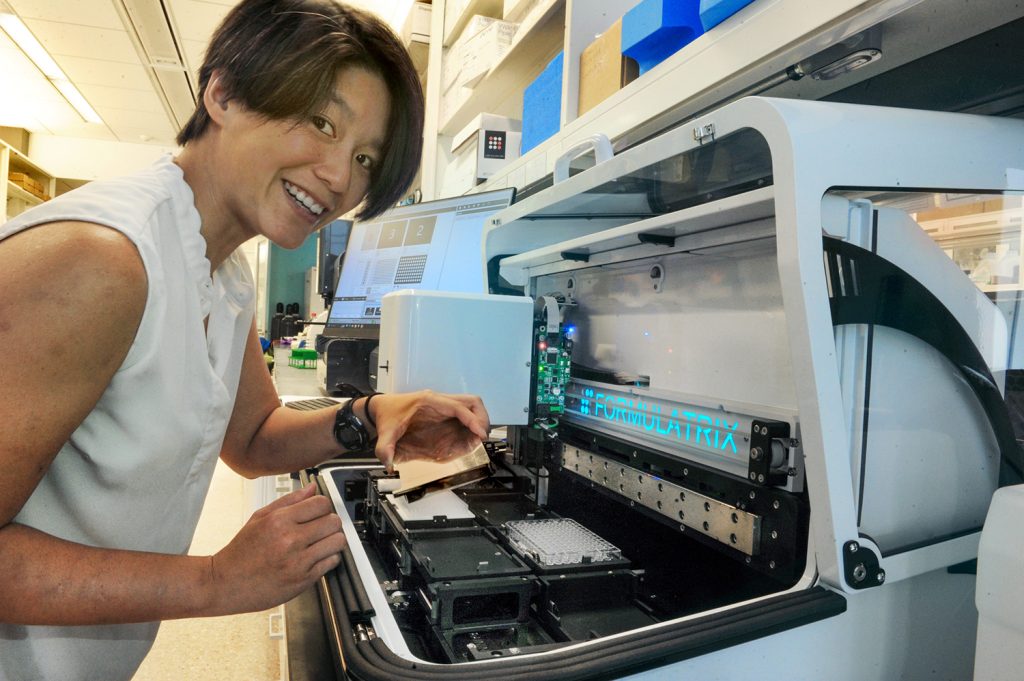
“Understanding how proteins function will help guide our understanding of how to develop drugs when proteins go rogue,” says UNC chemist Huong Kratochvil.
Huong Kratochvil takes inspiration from nature to build proteins from scratch to better understand how they work.
“Proteins are the workhorses of the cell and of living beings,” said the assistant professor in the department of chemistry, who joined Carolina in January 2023 and who addresses fundamental research questions through a combination of biophysics and protein design. “Understanding how proteins function will help guide our understanding of how to develop drugs when proteins go rogue.”
An example is the protein-protein interactions that allow SARS-CoV-2 to infiltrate cells, she said, adding, “We want to understand how these interactions happen. How can we develop drugs to target these proteins?”
Kratochvil grew up in the suburbs of Houston, Texas, and had always dreamed of being a doctor, but began thinking about pharmacy after finding medicine wasn’t a great fit during a high school hospital internship.
In undergraduate courses at the University of Texas at Austin, though, she gravitated to chemistry and knew she had found her passion.
“Everyone hates physical chemistry, but I fell in love with it because the math made sense. Everything came together for me, and I knew this is what I wanted to do,” said Kratochvil, who is a National Institutes of Health Pathway to Independence Fellow. “It helped me to make sense of the world around me, and it gave me the tools I can bring together to make discoveries that could help people.”
After graduating from UT-Austin with a bachelor’s in chemistry in 2010, she pursued graduate studies at the University of Wisconsin-Madison, receiving a Ph.D. in physical chemistry. She was recruited to UNC after postdoctoral work on the design of functional proton channels at the University of California, San Francisco.
“The academic appeal is UNC is a top-notch university for research,” she said. “And we have amazing core facilities here, with state-of-the-art technologies.”
Department chair Wei You said that his team has made a commitment to go after strong future leaders in their fields, young scholars like Kratochvil.
“People in the department are very supportive and collegial, and we have tried to embrace new talent across different areas of research and teaching and to help everyone grow to their maximum potential,” You said. “We know that approach benefits our students and is a key element to sustain excellence in Carolina chemistry.”
Kratochvil credits an undergraduate adviser as being an early mentor who “pushed me to get out of my comfort zone, to stop doubting myself and to be the best scientist I could be.”
Her UNC mentoring committee includes faculty members Matthew Redinbo, Bo Li and Marcey Waters.
“When I have specific problems, I can approach them, and they are helping me to navigate this deep ocean that you get dropped into,” Kratochvil said. She also appreciates being in the Genome Sciences Building, where an open lab space facilitates interaction with faculty across disciplines.
“I have coffee with my colleagues often,” she said. “They share information about their grants and how they’ve started their labs. I also love the chemistry department’s connection to the UNC School of Medicine because my research spans biology, human health and chemistry. I’ve also worked with people in the UNC Food Allergy Initiative.”
Kratochvil said she tries to lead her lab in a compassionate way.
“I’ve had stellar mentorship in the past, and I’ve also had the opposite, so I try to build on both the positives and the negatives in my own approach. I strive to be the best mentor I can be for my students and postdocs,” she said.
She encourages students who are apprehensive about pursuing a STEM major to be curious and proactive — to talk to professors and ask them about their research.
“Reach out and ask questions; professors are excited to talk about their work,” she said. “Do what you’re passionate about. I feel privileged that what I’m passionate about is what I do for a living.”
By Kim Spurr, College of Arts and Sciences
